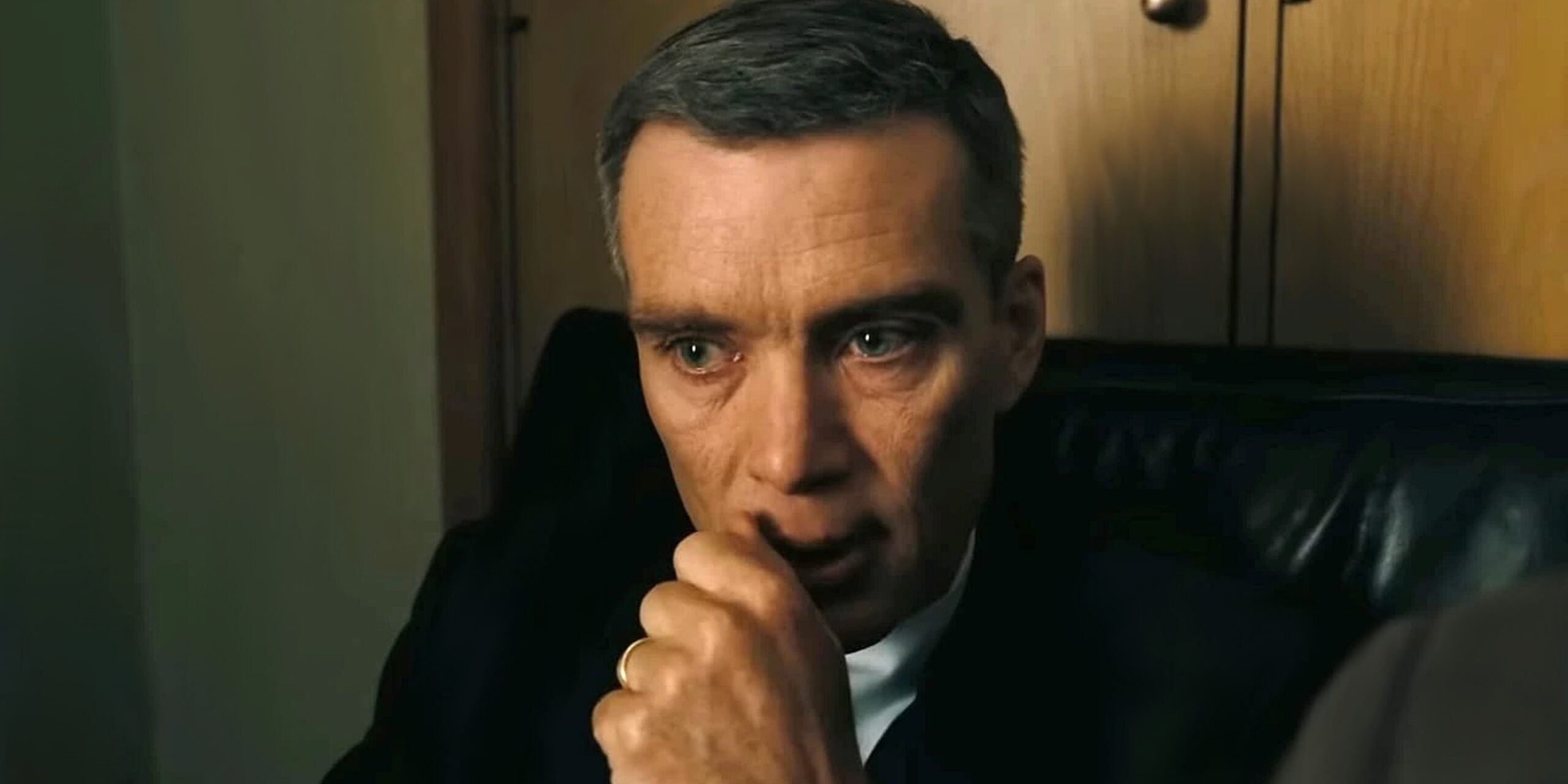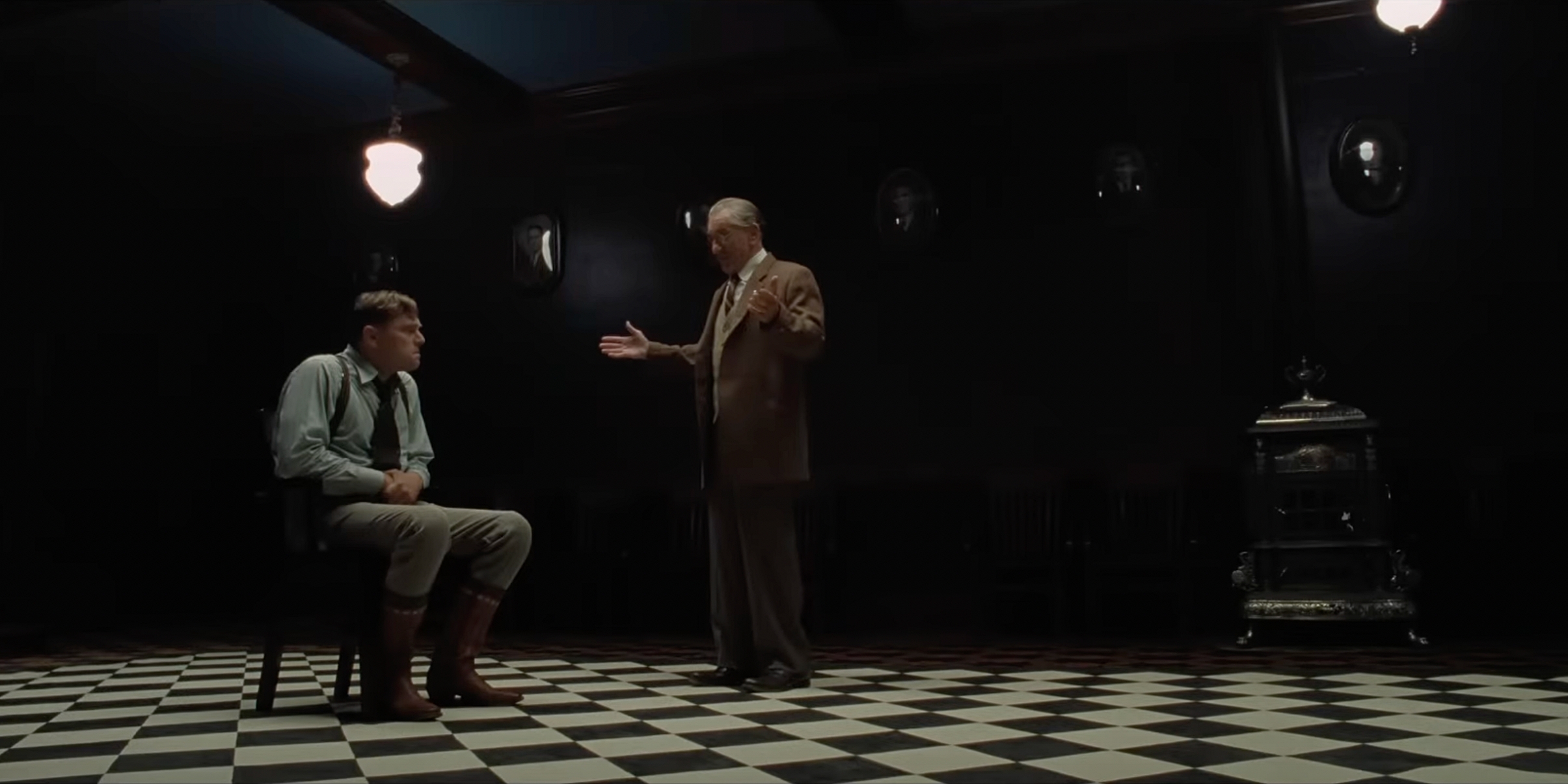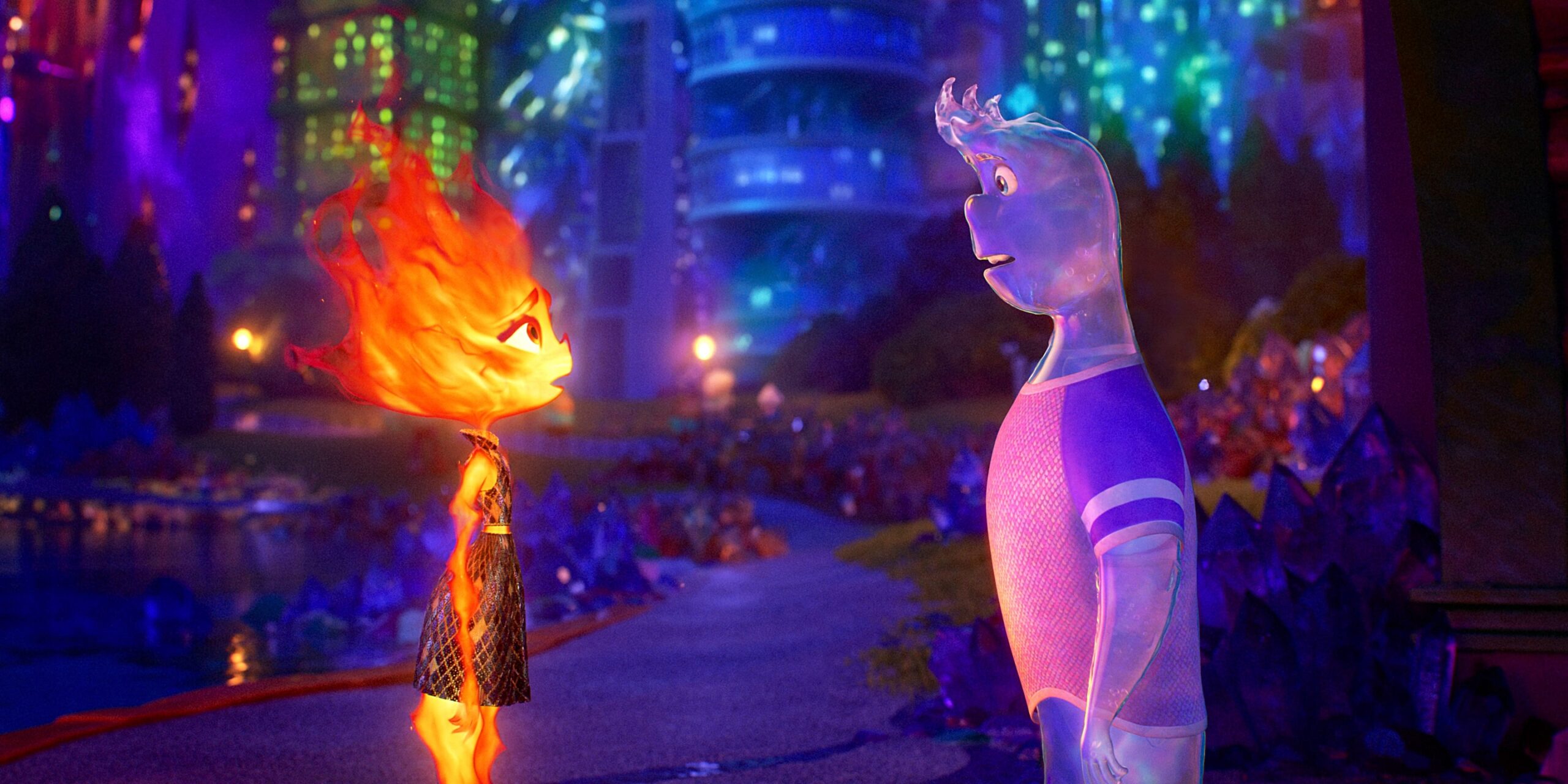Regarding this year’s Oscar race for Best Original Score, one would be hard-pressed to argue against the spectacular sounds of “Oppenheimer” taking home the gold. Christopher Nolan’s immersive achievement conveys the professional and personal life of J. Robert Oppenheimer (Cillian Murphy) on an emotionally intimate yet epic scale. The extraordinary balancing act between understated and imposing is mirrored beautifully by Oscar-winning composer Ludwig Göransson’s score. Göransson captures the gradual horror of Oppenheimer’s nuclear journey from theoretical physicist to the “father of the atomic bomb.” Just as Nolan and Murphy find intricate layers to Oppenheimer’s character and surroundings, so does the music. For instance, the various uses of the violin can shift the tone from excitable and romantic to anxiety-ridden and spine-chilling. From the scribbling notes of “Can You Hear The Music” and the escalating terror of “Trinity” to the unsettling sounds of “What We Have Done,” Göransson knows precisely when to stress the underlying core of a scene. The film’s show-stopping Trinity test sequence would not reverberate similarly without the score. Even in moments when the music does not feature so prominently, notes can be heard lingering in the background as a constant reminder of impending doom.
The music of “Oppenheimer” is such a colossal part of the film and a perfect extension of the visual achievements that it makes sense to consider Göransson as the Best Original Score frontrunner. His work has a certain undeniable factor; “Oppenheimer” is recognized as having one of, if not the most memorable and widely praised film scores of the year. The music is among the film’s most enthusiastic talking points and has sustained its buzz for months. While the year is not over just yet — with scores such as “The Color Purple” (Oscar nominee Kris Bowers), “Napoleon” (Martin Phipps), and “Wonka” (Joby Talbot) awaiting release — the winning combination of “Oppenheimer’s” critical and commercial success has made an enormous impact on how the Oscar race is shaping up to be. Helping matters is that Göransson himself is a familiar face within the Academy. Following his 2019 Oscar win for composing the “Black Panther” score, he received a 2023 Oscar nomination (shared with Ryan Coogler, Tems, and Rihanna) for the song “Lift Me Up” (featured in “Black Panther: Wakanda Forever“). Will the Academy “hear the music” and award Göransson a second time?
While the Academy often awards the same people for Best Original Score, the category is still up in the air. Outside of “Oppenheimer” and other familiar heavy hitters, including “Elemental” (Thomas Newman), “Asteroid City” (Alexandre Desplat), and “Indiana Jones And The Dial Of Destiny” (John Williams), there is a substantial opportunity for first-time nominees. “Killers of the Flower Moon” would mark the first (and posthumous) Oscar nomination for legendary musician Robbie Robertson of the rock band The Band. “Poor Things,” the newest concoction by Yorgos Lanthimos, is the first-ever score by Jerskin Fendrix. If Christopher Bear and Daniel Rossen (of the indie band Grizzly Bear) are nominated for “Past Lives,” they will continue the Oscar trend of bands-turned-film composers (Trent Reznor & Atticus Ross; Son Lux) being nominated. The recent history of the best score category works in favor of fresh faces. While composers like Newman and Desplat dominated the 2000s with multiple nominations per year between them, the Academy began welcoming many more newcomers into the category as of late. Over the past ten years, composers such as Justin Hurwitz, Jonny Greenwood, Terence Blanchard, Nicholas Britell, Hildur Guðnadóttir, and Emile Mosseri all became first-time Oscar nominees. In this same timeframe, except for 2015, each year had at least one first-time nominee, and four composers won on their first nomination (Steven Price for “Gravity“; Hurwitz for “La La Land“; Göransson for “Black Panther“; Guðnadóttir for “Joker“).
The recent history of the best score category works in favor of fresh faces. While composers like Newman and Desplat dominated the 2000s with multiple nominations per year between them, the Academy began welcoming many more newcomers into the category as of late. Over the past ten years, composers such as Justin Hurwitz, Jonny Greenwood, Terence Blanchard, Nicholas Britell, Hildur Guðnadóttir, and Emile Mosseri all became first-time Oscar nominees. In this same timeframe, except for 2015, each year had at least one first-time nominee, and four composers won on their first nomination (Steven Price for “Gravity“; Hurwitz for “La La Land“; Göransson for “Black Panther“; Guðnadóttir for “Joker“).
In addition to new names, the category could also see industry giants get their due, whether in the form of a long-awaited nomination or win. Recognition for Pixar’s “Elemental” would mark the sixteenth Oscar nomination for Thomas Newman, who has yet to win. Longtime Hayao Miyazaki collaborator Joe Hisaishi has received standout reviews from the fall festivals for his gorgeous “The Boy and the Heron” score. Hisaishi has never been nominated for an Oscar. Five-time Emmy winner Laura Karpman, known for composing music for television such as “Lovecraft Country” and Marvel’s “What If…?”, is in contention for “American Fiction,” the 2023 TIFF People’s Choice Award winner. Given the TIFF to Oscar pipeline, this bodes well for the film’s early Oscar chances. We might be underestimating the presence of “American Fiction” in multiple categories, including Best Original Score.
Are more of this year’s scores being underestimated? Will newcomers and potential first-time nominees overtake the heavy hitters? As the contenders continue to take shape, let’s take a look at where the category stands beyond “Oppenheimer” and the “Destroyer of Worlds.”
“Killers of the Flower Moon” (Robbie Robertson) Martin Scorsese and longtime collaborator, the late great Robbie Robertson, go back six decades. Scorsese’s 1978 concert film “The Last Waltz” documented the farewell concert of The Band, for which Robertson was the lead guitarist and songwriter. Since the film’s release, Robertson began composing, consulting, and producing music on numerous Scorsese pictures, from 1982’s “The King of Comedy” to 2019’s “The Irishman.” As a film composer, Robertson had received the most awards recognition for his work on “The Irishman.” That will very likely change this year with his astonishing final score for “Killers of the Flower Moon.” Robertson’s work on Scorsese’s latest picture is a haunting expression of Osage life in 1920s Fairfax, Oklahoma. In particular, the greed of white men and the conspiring murders of Osage Native Americans for oil wealth.
Martin Scorsese and longtime collaborator, the late great Robbie Robertson, go back six decades. Scorsese’s 1978 concert film “The Last Waltz” documented the farewell concert of The Band, for which Robertson was the lead guitarist and songwriter. Since the film’s release, Robertson began composing, consulting, and producing music on numerous Scorsese pictures, from 1982’s “The King of Comedy” to 2019’s “The Irishman.” As a film composer, Robertson had received the most awards recognition for his work on “The Irishman.” That will very likely change this year with his astonishing final score for “Killers of the Flower Moon.” Robertson’s work on Scorsese’s latest picture is a haunting expression of Osage life in 1920s Fairfax, Oklahoma. In particular, the greed of white men and the conspiring murders of Osage Native Americans for oil wealth.
During the film’s strong opening montage sequence, the booming electric guitar of the “Osage Oil Boom” track transports you to the Osage’s American history. Robertson’s evocative score sets the tone for what follows. From the use of drums and harmonicas to electric and acoustic guitars, the music captures the horror that flickers in the background until completely engulfing the Osage community. The recurring notes that play throughout the film, first heard in the “Heartbeat Theme / Ni-U-Kon-Ska” track, amplify the underlying threat to the community. As heard in the “Reign of Terror” and “Insulin Train” tracks, jazz and blues also play a significant part. Robertson’s singular talent is on remarkable display, and his contribution to film is long overdue for recognition. If one score could reach the frontrunner status of “Oppenheimer,” “Killers of the Flower Moon” fits the bill.
“Elemental” (Thomas Newman) When animation reaches categories outside Best Animated Feature, Best Original Score is often next in line. The Academy has an overall steady track record of recognizing the scores from animated films. From 2001’s “Monsters, Inc.” and 2009’s “Up,” to 2020’s “Soul” and 2021’s “Encanto,” Disney and Pixar films, in particular, have seen the strongest representation. This will likely continue with Pixar’s “Elemental,” a love story set in a city where the residents are elements — fire, water, earth, and air. The film is inspired by director Peter Sohn’s experiences of immigrating from Korea to the United States. Helping to convey the inspiration is one of the most distinctive and uplifting composers, Thomas Newman. The 15-time Oscar nominee, whose previous work in animation includes 2003’s “Finding Nemo” and 2008’s “WALL-E” (both nominated in their respective years), brings his familiar aesthetic to “Elemental.” He continues to find subtle ways of capturing an imaginary world’s sounds while tapping into palpable human emotion.
When animation reaches categories outside Best Animated Feature, Best Original Score is often next in line. The Academy has an overall steady track record of recognizing the scores from animated films. From 2001’s “Monsters, Inc.” and 2009’s “Up,” to 2020’s “Soul” and 2021’s “Encanto,” Disney and Pixar films, in particular, have seen the strongest representation. This will likely continue with Pixar’s “Elemental,” a love story set in a city where the residents are elements — fire, water, earth, and air. The film is inspired by director Peter Sohn’s experiences of immigrating from Korea to the United States. Helping to convey the inspiration is one of the most distinctive and uplifting composers, Thomas Newman. The 15-time Oscar nominee, whose previous work in animation includes 2003’s “Finding Nemo” and 2008’s “WALL-E” (both nominated in their respective years), brings his familiar aesthetic to “Elemental.” He continues to find subtle ways of capturing an imaginary world’s sounds while tapping into palpable human emotion.
While Newman’s sound is easily recognizable, “Elemental” is one of his most experimental scores yet. The tracks contain strong mystical cues, jazzy strings, and vocal chatters. For the themes of protagonists Ember and Wade, Newman combines both fiery and fluid elements; the “Bubble Date” track has the sounds of early affection between the two characters. Newman’s overall work is a unique, spiritual score that crackles with excitement. While the Academy might not be in a rush to award Newman given this year’s competition, his consistent track record and distinctive sound put “Elemental” in a solid position to be nominated.
“Spider-Man: Across the Spider-Verse” (Daniel Pemberton) Daniel Pemberton’s energetic score for “Spider-Man: Across the Spider-Verse” deserves to be nominated across multiple universes. Pemberton, a previous Oscar nominee in Best Original Song for “Hear My Voice” (from “The Trial of the Chicago 7“), expands on his work from 2018’s “Spider-Man: Into the Spider-Verse” with even bigger bursts of creativity. He incorporates the epic sounds of a superhero film with sonically unique choices. From the catchy whistles of “Miles Sketchbook” and twisty cues of “Peter and Mayday Parker” to the futuristic notes of “Spider-Man 2099” and the heroic sensations of “Across the Spider-Verse (Start a Band).” Each track expresses a colorful set of emotions.
Daniel Pemberton’s energetic score for “Spider-Man: Across the Spider-Verse” deserves to be nominated across multiple universes. Pemberton, a previous Oscar nominee in Best Original Song for “Hear My Voice” (from “The Trial of the Chicago 7“), expands on his work from 2018’s “Spider-Man: Into the Spider-Verse” with even bigger bursts of creativity. He incorporates the epic sounds of a superhero film with sonically unique choices. From the catchy whistles of “Miles Sketchbook” and twisty cues of “Peter and Mayday Parker” to the futuristic notes of “Spider-Man 2099” and the heroic sensations of “Across the Spider-Verse (Start a Band).” Each track expresses a colorful set of emotions.
Pemberton’s score keeps up with and elevates the world-building of “Spider-Man: Across the Spider-Verse.” The playful use of various musical genres, from hip-hop and electronic to avant-garde and classical, holds the sprawling ideas together. Much like the film’s different animation styles, the score is full of layers and maintains a consistent vision throughout. It’s a brilliant showcase of Pemberton’s talent. While he has never been Oscar-nominated for his scores and missed out for “Spider-Man: Into the Spider-Verse,” there is something to be said for the standout notices and critical reception he has received for the sequel film. Plus, following “Into the Spider-Verse’s” Oscar win for Best Animated Feature and “Spider-Man: Across the Spider-Verse’s” frontrunner status in the same category, Pemberton can get a boost from the incoming spidey chatter during the thick of award season.
“Past Lives” (Christopher Bear & Daniel Rossen) An early Oscar contender that can show up strong in the Best Original Score category is Celine Song’s emotionally stirring “Past Lives.” Grizzly Bear drummer Christopher Bear and guitarist/co-lead vocalist Daniel Rossen complement the deep longing of the story with a harmonious score that leaps through time. Soft piano keys, strings, and cellos convey the sounds of the characters’ emotions. Whether nostalgia and yearning or hopefulness and uncertainty, the music traces them gently through the past, present, and future.
An early Oscar contender that can show up strong in the Best Original Score category is Celine Song’s emotionally stirring “Past Lives.” Grizzly Bear drummer Christopher Bear and guitarist/co-lead vocalist Daniel Rossen complement the deep longing of the story with a harmonious score that leaps through time. Soft piano keys, strings, and cellos convey the sounds of the characters’ emotions. Whether nostalgia and yearning or hopefulness and uncertainty, the music traces them gently through the past, present, and future.
Bear and Rossen approach the score with a sense of discreetness and simplicity. They find ways to evoke what it feels like for two childhood friends, Nora (Greta Lee) and Hae Sung (Teo Yoo), to exist between various versions of their own lives. Their emotional growth is expressed beautifully through the reprise of specific cues (heard in tracks “Why Are You Going to New York” and “An Immigrant and a Tourist”). If nominated for “Past Lives,” Bear and Rossen would follow in the footsteps of other Oscar-nominated band members (Trent Reznor & Atticus Ross; Son Lux) who explored the world of film composing. Recognition for the score would further indicate how strong the love for “Past Lives” is.
Other strong contenders:
“Poor Things” (Jerskin Fendrix)
A newcomer onto the scene with his first-ever film score, Jerskin Fendrix could very well be along for the Oscar ride with “Poor Things,” one of the biggest across-the-board contenders of the year. Most notably, how the score progresses in its development from simple and bizarre to grandiose and full of life just as the character Bella Baxter does is something the music branch may respond to.
“The Boy and the Heron” (Joe Hisaishi)
With glowing reviews out of the fall festivals and a category still up in the air, “The Boy and the Heron” could be the film to bring Joe Hisaishi an Oscar nomination finally.
“Asteroid City” (Alexandre Desplat)
When two-time Oscar winner Alexandre Desplat has a new score, his name is understandably etched onto prediction lists. With a nomination tally of eleven, three of which are for a Wes Anderson film, Desplat could be one of the heavy hitters that sneak in for his latest work on “Asteroid City.”
“The Zone of Interest” (Mica Levi)
Previously Oscar-nominated for scoring 2016’s “Jackie,” Mica Levi has an ear for the unsettling. With “The Zone of Interest,” Levi creates another haunting score that adds impactful layers to a disturbing story.
“Indiana Jones and the Dial of Destiny” (John Williams)
The latest Indiana Jones adventure, “Indiana Jones And The Dial Of Destiny,” may not live up to all its predecessors, but the magic of John Williams’ score is just as satisfying. A winning combination of new themes and nostalgic sounds, don’t underestimate the Academy’s opportunity to nominate a familiar favorite.
“The Killer” (Trent Reznor & Atticus Ross)
While two-time Oscar-winning duo Trent Reznor and Atticus Ross can be hit or miss with the Academy, count on their collaborations with David Fincher to deliver the goods and from what has been reported, “The Killer” is no different.
“Barbie” (Mark Ronson and Andrew Wyatt)
Keep an eye on the technicolor hit “Barbie” to potentially find its way into the category if the film over-performs with the Academy. The whimsical music by Oscar winners Mark Ronson and Andrew Wyatt (who won for the song “Shallow” from “A Star Is Born“) is a playful extension of Greta Gerwig’s Barbieland.
“Carmen” (Nicholas Britell)
It may be a passion pick from those who have seen it on the Next Best Picture team (its extravagance is more than worthy to be listed here though), but considering Britell has already amassed three Academy Award nominations in the last seven years for Best Original Score (“Moonlight,” “If Beale Street Could Talk” and “Don’t Look Up“) plus his popularity from working on television projects such as “Succession” and “Andor” (which he’s nominated for three Emmy awards this year between the two), who’s to say he’s not at least a contender?
What do you think is going to be nominated for Best Original Score? What are some of your favorite films scores from 2023? Please let us know in the comments section below or on our Twitter account and check out our latest Oscar predictions here.






